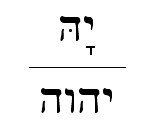Jah
Hebrew Bible theonym
Jah (Hebrew: יָהּ), alternatively written Yah, is one of the names of God in the Hebrew Bible. It is a short form of the Tetragrammaton, יהוה (YHWH). It occurs at the end of the word "Hallelujah" (הַלְּלוּ־יָהּ), which means "praise Jah". The King James Version translation of the Bible translates יָ֥הּ as "Jah" in Psalms 68:4, and the New King James Version translation translates it as "Yah". Otherwise, it is conventionally translated as "Lord", just like the Tetragrammaton. The name Jah is used by adherents of Rastafarianism to refer to God.

Quotes
editHebrew Bible
edit- עׇזִּ֤י וְזִמְרָת֙ יָ֔הּ וַֽיְהִי־לִ֖י לִֽישׁוּעָ֑ה זֶ֤ה אֵלִי֙ וְאַנְוֵ֔הוּ אֱלֹהֵ֥י אָבִ֖י וַאֲרֹמְמֶֽנְהוּ׃
- Exodus 15:2
- Translations:
- יהוה is my strength and might; He is become my deliverance. This is my God and I will enshrine Him; the God of my father's [house], and I will exalt Him.
- The Lord is my strength and song, and he is become my salvation: he is my God, and I will prepare him an habitation; my father's God, and I will exalt him.
- The Lord is my strength and song, and He has become my salvation; He is my God, and I will praise Him; my father's God, and I will exalt Him.
- The Lord is my strength and song, for he saved me; He is my God whom I shall praise, my father's God whom I shall extol.
- שִׁ֤ירוּ ׀ לֵאלֹהִים֮ זַמְּר֢וּ שְׁ֫מ֥וֹ סֹ֡לּוּ לָרֹכֵ֣ב בָּ֭עֲרָבוֹת בְּיָ֥הּ שְׁמ֗וֹ וְעִלְז֥וּ לְפָנָֽיו׃
- Psalms 68:4
- Translations:
- Sing to God, chant hymns to His name; extol Him who rides the clouds; the Lord is His name. Exult in His presence.
- Sing unto God, sing praises to his name: extol him that rideth upon the heavens by his name Jah, and rejoice before him.
- Sing to God, sing praises to His name; extol Him who rides on the clouds, by His name Yah, and rejoice before Him.
- Sing unto God; praise his name! Extol him who rides upon the storm-clouds, whose name is Yah, and exult before him!
- הַ֥לְלוּ־יָ֨הּ ׀ הַ֭לְלוּ עַבְדֵ֣י יְהֹוָ֑ה הַֽ֝לְל֗וּ אֶת־שֵׁ֥ם יְהֹוָֽה׃
- Psalms 113:1
- Translations:
- Hallelujah. O servants of the Lord, give praise; praise the name of the Lord.
- Praise ye the Lord. Praise, O ye servants of the Lord, praise the name of the Lord.
- Praise the Lord! Praise, O servants of the Lord, praise the name of the Lord!
- Hallelujah! Praise, O servants of the Lord; praise the name of the Lord!
- מִֽן־הַ֭מֵּצַר קָרָ֣אתִי יָּ֑הּ עָנָ֖נִי בַמֶּרְחָ֣ב יָֽהּ׃
- Psalms 118:5
- Translations:
- In distress I called on the Lord; the Lord answered me and brought me relief.
- I called upon the Lord in distress: the Lord answered me, and set me in a large place.
- I called on the Lord in distress; the Lord answered me and set me in a broad place.
- When in straits, I called upon the Lord; He answered me with abundant room.
- אָמַ֙רְתִּי֙ לֹא־אֶרְאֶ֣ה יָ֔הּ יָ֖הּ בְּאֶ֣רֶץ הַחַיִּ֑ים לֹא־אַבִּ֥יט אָדָ֛ם ע֖וֹד עִם־י֥וֹשְׁבֵי חָֽדֶל׃
- Isaiah 38:11
- Translations:
- I thought, I shall never see Yah, Yah in the land of the living, or ever behold men again among those who inhabit the earth.
- I said, I shall not see the Lord, even the Lord, in the land of the living: I shall behold man no more with the inhabitants of the world.
- I said, "I shall not see Yah, the Lord in the land of the living; I shall observe man no more among the inhabitants of the world."
- I said, "I shall no more see the Lord in the land of the living; I shall no more look upon man among the inhabitants of the world."
Rabbinic literature
edit- בשלשים ושתים נתיבות פליאות חכמה חקק יה יהוה צבאות אלהי ישראל אלהים חיים ומלך עולם אל שדי רחום וחנון רם ונשא שוכן עד מרום וקדוש שמו וברא את עולמו בשלשה ספרים בספר וספר וספור׃
- Sefer Yetzirah, 1:1
- Translation:
- Yah, the Lord of hosts, the living God, King of the Universe, Omnipotent, All-Kind and Merciful, Supreme and Extolled, who is Eternal, Sublime and Most-Holy, ordained (formed) and created the Universe in thirty-two mysterious paths of wisdom by three Sepharim, namely: 1) S'for סְפָר; 2) Sippur סִפּוּר; and 3) Sapher סֵפֶר which are in Him one and the same.
Quotes about Jah
edit- "Yah", an abbreviated form of the Tetragrammaton, occurs 23 times: 18 times in the Psalms, twice in Exodus, and three times in Isaiah. This form is identical with the final syllable in the word "Hallelujah", which occurs 24 times in the last book of the Psalms (comp. also "be-Yah", Isa. xxvi. 4 and Ps. lxviii. 5). It is transcribed by the Greek "Ia", as "Ehyeh" is represented by "Aia", thus showing that "Yah" was the first syllable of יהוה.
- Crawford Howell Toy and Ludwig Blau: "Tetragrammaton". Jewish Encyclopedia.
- The Yod (י) must be attached to the Heh (ה) to make YH (יה). This is the Inner Chamber [since these are the first two letters of the Tetragrammaton, YHVH (יהוה)]. This is the place that conceals the highest point, which is the Yod (י).
- Aryeh Kaplan: Meditation and Kabbalah, ch. 2, "Talmudic Mystics", p. 34. Weiser Books (1982). ISBN 0-87728-616-7.